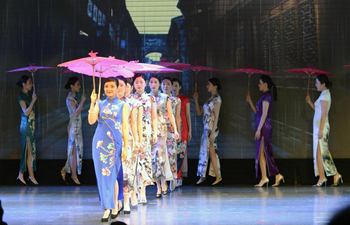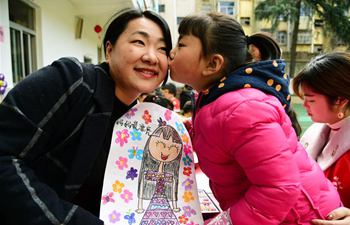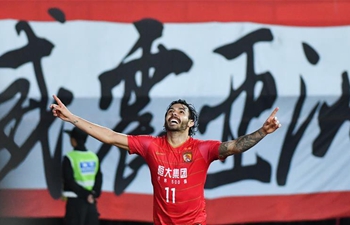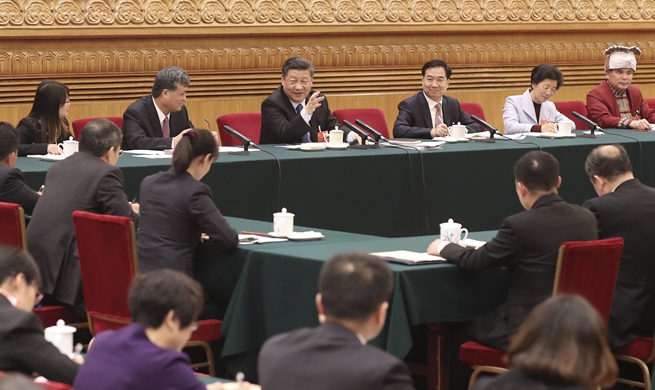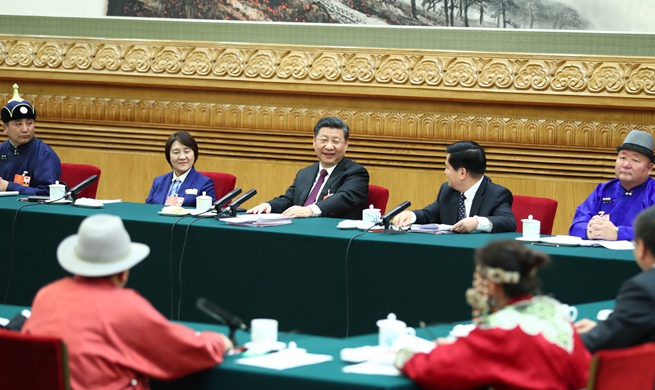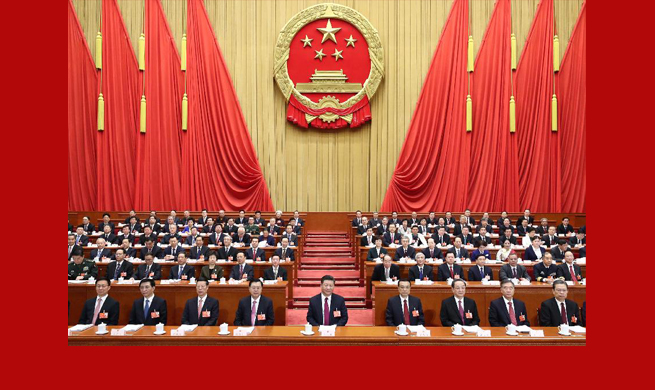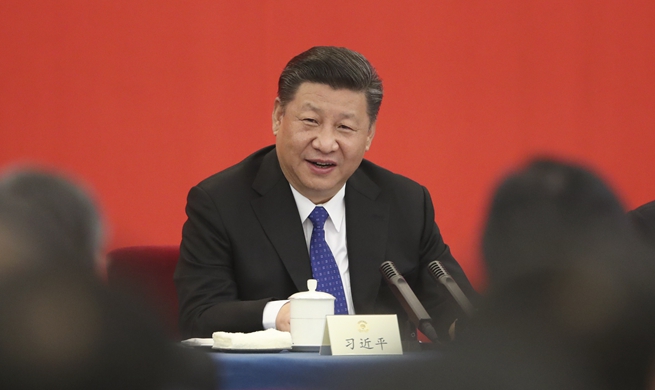by Mahmoud Fouly
CAIRO, March 7 (Xinhua) -- Syria has become a theatre for regional and international actors with different and even conflicting goals and interests, while fighting terrorism represented by the Islamic States (IS) militant group and its affiliates is depicted as a common goal.
The recent escalation in Syria with the government shelling rebel-held regions and the involvement of Turkey in its anti-Kurd crackdown northeastern Syria complicate the situation in the war-torn country and narrow down its chances for a near settlement, said Egyptian political experts.
The government forces of Syrian President Bashar al-Assad are practically backed by Russia, Iran and Shiite militias loyal to Iran including Lebanon's Hezbollah.
Meanwhile, the United States is leading an international anti-terror alliance targeting the IS while Turkey has recently been fighting against the Kurds in Syria's Afrin enclave.
In a couple of weeks, at least 800 people have been killed in the ongoing Syrian military strikes on the besieged enclave of Eastern Ghouta near the capital Damascus, according to the Britain-based Syrian Observatory for Human Rights.
OPPOSITION-TERROR MIX
Since the seven-year old crisis started, the Assad forces always argued that they have been going through a war against terrorism.
"The mixture between terrorism and some opposition forces in Syria has further complicated the situation. There's surely an anti-terror war and no one supports terrorism, but each power involved in Syria defines terrorists differently," said Hassan Nafaa, a political science professor at Cairo University, confirming that the IS and Jabhat al-Nusra are unanimously labeled as terrorist groups.
The past peacemaking talks via UN-sponsored meetings between representatives from the Syrian regime and the exiled opposition failed to reach a common ground.
The ongoing Geneva talks on Syria do not include Syrian participants but they have diplomats from Russia, Iran, Turkey and the UN instead.
"The Syrian opposition is part of the problem, not the solution. Some opposition groups are close to Russia and Iran, and others to the United States and Saudi Arabia. Yet, they are all fragile, ineffective and disunited," the professor told Xinhua.
In late February, the UN Security Council unanimously adopted a resolution calling for an immediate 30-day ceasefire in Syria to allow for humanitarian aids and medical evacuations in besieged conflict-stricken regions. However, the Syrian government's forces continued the strikes.
Assad's government defended the operation in Eastern Ghouta saying it is "part of its duty to fight terrorism in accordance with the international law."
The Syrian Foreign Ministry said Wednesday that all measures have been undertaken to ensure the protection of civilians in accordance with the Russian-backed daily humanitarian pause that was implemented following the adoption of the recent ceasefire resolution.
"Ghouta operation is meant to ensure the victory of the tripartite alliance of Syria, Russia and Iran and to gain more ground and expand government-controlled areas," said Mohamed Fayez Farahat, political expert and researcher at Cairo-based Al-Ahram Center for Political and Strategic Studies.
"The Syrian semi-armed opposition groups have eventually lost contrast with terrorist groups and appeared as if they are in one camp in confrontation of the strong Syrian regime that promotes its battle as an anti-terror war," Farahat told Xinhua.
Experts generally believe that the difficulty to distinguish between political and terrorist groups in Syria complicates the crisis as the "main operators" of these groups are the regional and international powers involved in the chaotic issue to achieve their own interests.
TURKEY INVOLVED
Regionally, Iran and Israel are involved in some way or another in the Syrian crisis and internationally Russia and the United States are the main players.
The oil-rich Gulf states led by Saudi Arabia, which escalated the crisis in the first place, started to give up the whole Syrian scene due to their marginal role in the issue.
Turkey's involvement in Syria's Afrin, with a nod from Russia, is driven by its concerns about the Turkish borders with Syria amid Kurdish hopes to establish their own independent state in bordering regions.
"The situation in Syria is very complicated and Turkey's intervention further complicates it, for Syria has become a theatre for regional and international conflicts and the best example to reflect the contradictions of the Middle Eastern and the international systems," Nafaa told Xinhua.
The Turkish army launched in January an operation against the Kurdish People's Protection Units (YPG) militia in their Afrin border enclave.
While Ankara refers to Kurdish militia forces as "terrorists," the Pentagon said the Turkish Afrin offensive caused an "operational pause" in the U.S.-led anti-terror operations in the region.
The YPG is a large part of the U.S.-backed Syrian Democratic Forces (SDF) in the war against IS.
Ahmed Eliba, a political researcher and writer at Egypt's largest state-run Al-Ahram newspaper, described Moscow's disregard of Ankara's anti-Kurd assault in Afrin as "international compliment to polarize Turkey," noting that the Syrian regime also remained silent to the Turkish intervention.
"I believe that Russia is the balance keeper between the Turks and the Syrians when it comes to Afrin," he told Xinhua, arguing that the Syrian regime might have been neutral towards Afrin over concerns similar to those of Turkey.
NARROW WAY OUT
Dominated by conflicting regional and international powers, the Syrian crisis does not seem to have an imminent solution except through dialogue, understanding and coordination between concerned parties.
"A U.S.-Russia agreement is required for a solution, which is difficult to reach; a Turkish-Iranian-Israeli agreement is also required but it is more difficult to reach; and an agreement among the Syrian opposition is required and its is the most difficult of them," Nafaa lamented.
As for Eliba, he believes that "a settlement process can start after the war dust settles, not vice versa," Eliba said, stressing that the party with a stronger position will have the upper hand in the settlement process.
The Cairo-based Arab League said in a concluding meeting on Wednesday that "there is no settlement for the Syrian crisis except through political dialogue between all parties."




